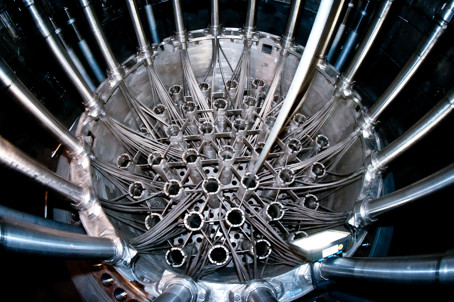Nuclear Power Engineering Equipment
Co Vás naučíme?

The current situation in the field of electric power production and heat supply suggests the need for the use of nuclear energy in a larger scale. There is currently a lack of experts in the field who are essential for this “nuclear renaissance”. However, they are not only experts focused merely on nuclear energy but experts in technical fields in general. It is obvious that nuclear engineers will form the core of teams focused on the development and construction of new nuclear units in the Czech Republic.
Tutors: doc. Ing. Michal Kolovratník, CSc., Ing. Václav Dostál, Ph.D.
Czech Technical University in Prague intends to expand the range of fields of study by this field which builds on previous programmes of study at the Faculty of Engineering where the subjects of nuclear energy facilities are or were taught. It is a synthesis and extension of existing capacities for training of nuclear engineers which would cover the expected future demand. It is expected that a major part of students are those already working in the industry in order to increase their expertise. The programme has a part and full time form of study.
The program is run mainly by the Institute of Fluid Mechanics and Energetics, Department of Thermal and Nuclear Power Plants. Some compulsory elective courses are provided by tutors of other departments of the Faculty of Mechanical Engineering. Faculty of Nuclear Sciences and Physical Engineering also provides some of the subjects. Major part of the subjects is taught by experts from the field. Contact between students and experts is seen as crucial for the subsequent career success of the graduates. Among those who largely participate in lectures can be named researchers of Nuclear Research Institute (NRI) Řež a.s. and the chairwoman of the State Office for Nuclear Safety Dana Drábová.
Graduates of this programme are professionals for the nuclear power industry, they gain knowledge of design, implementation and management of existing nuclear power plants and an overview in the area of new advanced nuclear reactors and their research and development so that they are able to participate in such research and development. Graduates are thus experts especially in the design and operation of nuclear facilities as a whole, with an emphasis on mechanical issues (nuclear safety systems, cooling technology, materials and their lifetime, supporting technology of nuclear facilities, the issue of nuclear fuel cycle). It is also possible to study subjects focused on conventional power and thereby gain a full understanding of energy issues.
Graduates get a general, broad cross-sectional overview rather than expert knowledge focused just on one field. Graduates will find suitable jobs in design and supply firms where they could e.g. design nuclear facilities. It could be for example Energoprojekt NRI Rez a.s., Skoda Praha a.s., etc. They could also hold positions in the management and operation of nuclear facilities, such as key management of CEZ a.s. and nuclear power plants Dukovany and Temelín. Last but not least, suitable jobs are within the sphere of production of the nuclear industry Škoda JS a.s., Envinet a.s., etc. Graduates’ knowledge is also valuable for science and research, especially in the Nuclear Research Institute in Rez, at universities and possibly in the state administration – SÚJB (State Office for Nuclear Safety), SÚRAO etc.
Curriculum
- 15 compulsory subjects: Energetics Heat Cycle, Neutron Theory of Nuclear Reactors, Thermohydraulics of Nuclear Reactors I, Nuclear Systems, Steam Generators and Piping Systems in NPP, Thermohydraulics of Nuclear Reactors II, Design and Economics of Power Facilities I, Steam and Gas Turbines for NPP, Technology of Nuclear Fuel Cycle of NPP, Automation and Control in NPP, Operation of Nuclear Power Devices, Design and Economics of Power Facilities II, Pumps for Nuclear Power Energy, Materials for NPP
- 3 projects and diploma thesis
- 4 seminars in Nuclear Energy
- 10 compulsory elective subjects – 6 out of them must be from the following: Steam Boilers, Ionizing Radiation and Radiation Protection, Nuclear Fuels, Dynamics and Reactor Physics, Cooling Equipment and Heat Pumps, Lifetime Management of Materials and Construction, Measurement and Experiments, Water Treatment, Social Aspects of Power Industry, Electrical Machinery.
Students must obtain the total number of 120 ECTS. Students obtain 30 ECTS per semester in 2 year follow-up Master’s programme Nuclear Power Energy Equipment. There are 25 classes a week. The recommended curriculum has 3 options so it enables suitable formation of student’s professional profile and it also accounts the previous bachelor programmes attended. Thus the focus can be on design of nuclear equipment, control of nuclear equipment or energetics in general. Given the structure of compulsory elective subjects within the programme the students can choose up to two of these focuses.
Possible individual plans will be in accordance with these approved and accredited curricula. The admission process for the field Nuclear Power Energy Equipment is in compliance with rules for admission for other programmes of follow-up Master’s programme. The students are required to pass admission exam focused on basic knowledge of the following subjects: Fluid Mechanics and Thermomechanics, or more precisely: Thermodynamics.


